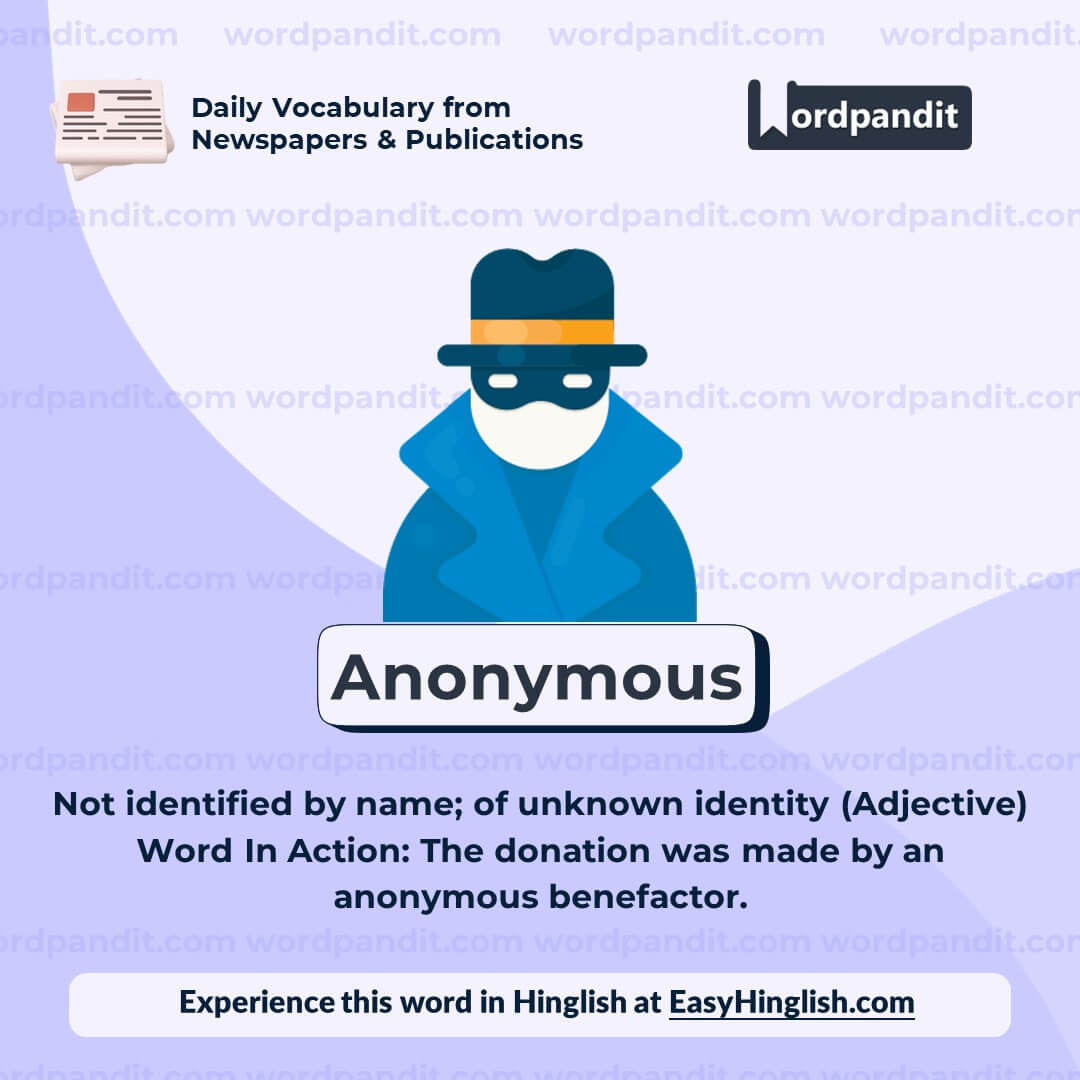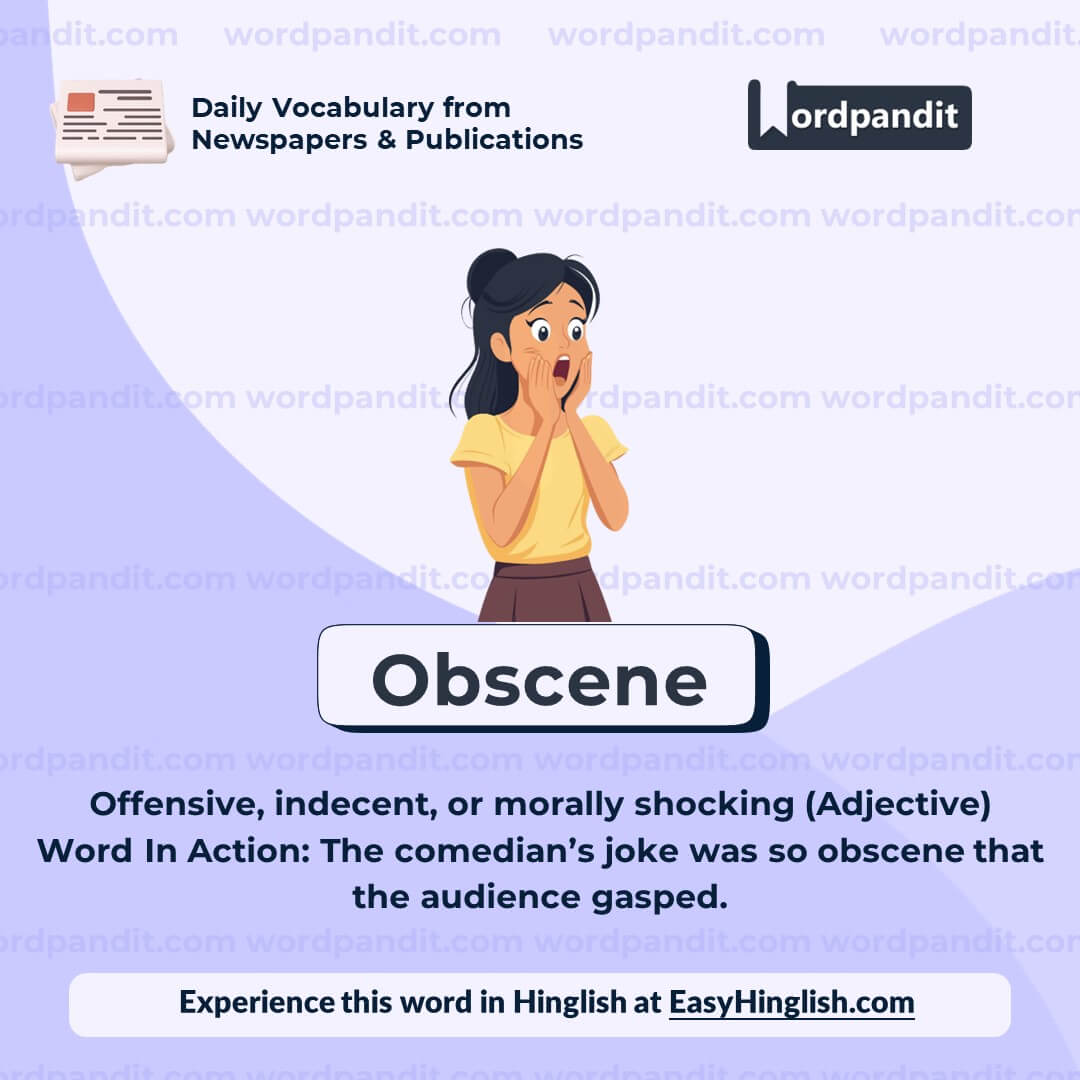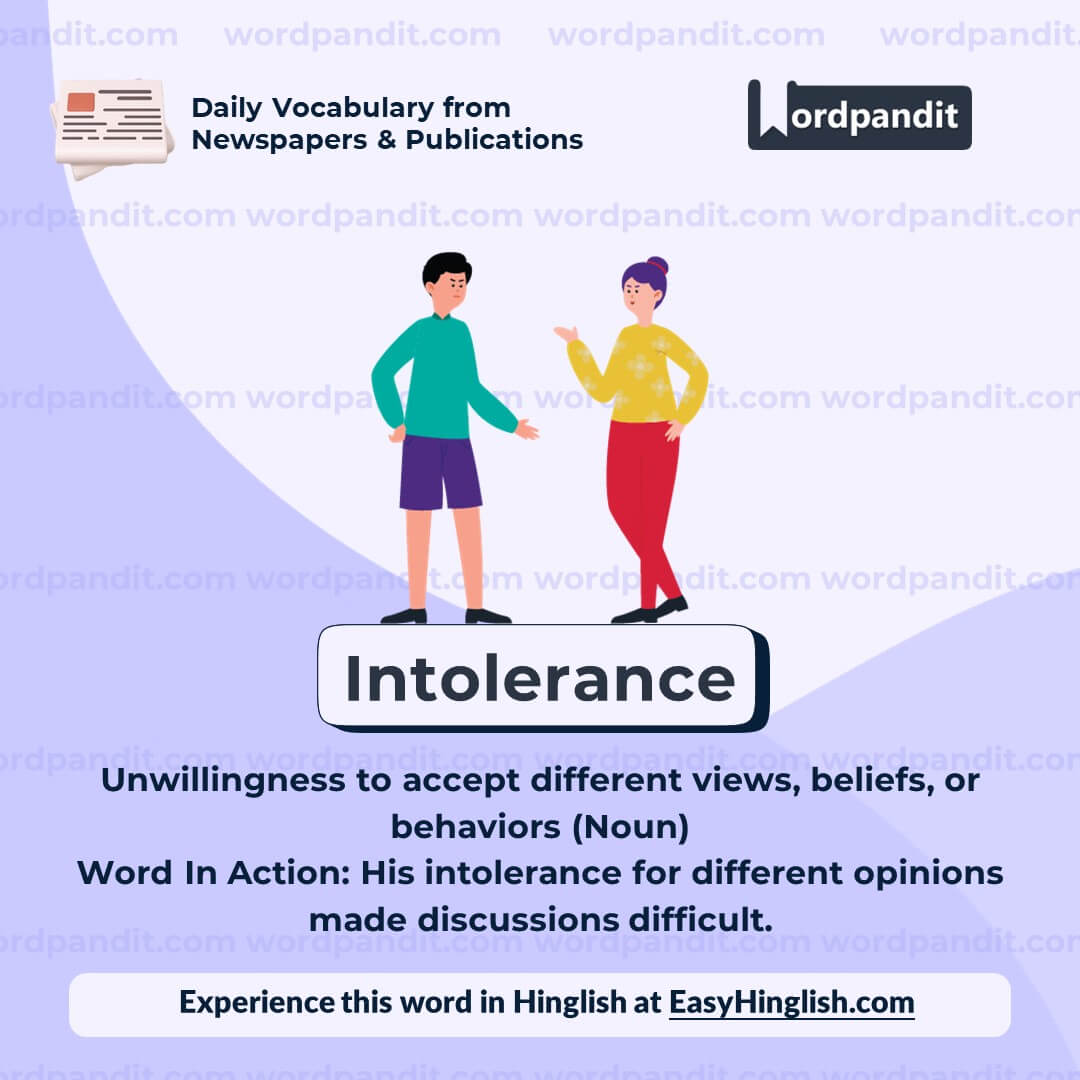Daily Vocabulary from Indian Newspapers and Publications
Welcome to Wordpandit’s Indian Vocabulary Hub
At Wordpandit, we understand the importance of staying rooted in the local context while expanding your language skills. This section focuses on enriching your vocabulary with words and phrases drawn from India’s leading newspapers and publications, ensuring you're learning vocabulary that is practical, relevant, and uniquely Indian.
Why Indian Sources Matter
We believe that the best way to master any language is by immersing yourself in local content. That’s why we carefully curate vocabulary from top Indian publications, including:
- The Hindu
- The Times of India
- The Economic Times
- Hindustan Times
- Live Mint
- The Indian Express
- And many others...
Stay Updated, Stay Relevant
With daily updates from Indian news sources, you’ll be consistently learning words that reflect the trends and shifts in Indian society and culture. Our focus is to provide vocabulary that enhances your understanding of the language in an Indian context.
How Wordpandit Supports Your Goals
Whether you’re preparing for exams, aiming to improve your professional communication, or simply want to stay connected with the latest Indian vocabulary, Wordpandit is here to guide you every step of the way.
Learn with a Practical Approach
Our interactive learning methodology includes real-world examples, engaging activities, and context-specific usage to ensure that every word becomes part of your active vocabulary.
Dive into Indian Vocabulary Today!
Why Choose Wordpandit?
Practical Learning: Focus on words you'll actually encounter in real-world reading, enhancing your comprehension and communication skills.
Diverse Content: From current affairs to scientific breakthroughs, our varied sources expose you to vocabulary across multiple domains.
Effortless Integration: Make Wordpandit a part of your daily routine. Just a few minutes each day can significantly boost your lexicon over time.
Your Path to Vocabulary Mastery
- Visit our Daily Vocabulary section regularly
- Explore new words and their usage in context
- Practice incorporating these words into your own writing and speech
- Track your progress as your vocabulary expands
Start Your Journey Today
Embark on your vocabulary enhancement journey with Wordpandit. By consistently engaging with our daily posts, you'll build a robust vocabulary that serves you well in academic, professional, and personal contexts.
Remember, a word a day keeps linguistic limitations at bay. Make Wordpandit your daily companion in the quest for vocabulary excellence!
WORD-1: Commuters
Context:
"Another issue that has been a frequent hindrance to commuters and pedestrians is several cars and buses parked in a row on both narrow and broad lanes, some in unexpected spaces." - The Hindu
Explanatory Paragraph:
The word "commuters" refers to individuals who travel regularly between their place of residence and workplace or school. These travelers typically use various modes of transportation, such as buses, trains, or personal vehicles. The term is commonly used in urban settings where people must cover considerable distances daily to reach their destinations.
Meaning: People who travel regularly between home and work or school (Noun)
Pronunciation: kuh-MYOO-terz
Difficulty Level: ⭐⭐ Beginner
Etymology: Derived from the Latin word commutare, meaning "to change or exchange." The term "commute" was later adapted in English to mean "travel back and forth regularly."
Synonyms & Antonyms:
Synonyms: Travelers, passengers, daily travelers, urban workers
Antonyms: Residents, homebodies, non-travelers
Usage Examples:
- Many commuters prefer using public transportation to avoid heavy traffic during peak hours.
- The city introduced new bus routes to make commuting easier for daily commuters.
- During the rainy season, commuters often face delays due to waterlogged streets.
- Commuters in metropolitan cities rely heavily on metro rail networks for quick travel.
Cultural Reference:
"The daily struggles of commuters in overcrowded trains and buses have inspired many films and literary works highlighting urban life challenges." - [Urban Life Studies]
Think About It:
How do different cities around the world manage the daily commute of millions of people efficiently?
Quick Activity:
List three common challenges that commuters face in your city and suggest possible solutions.
Memory Tip:
Think of "commuters" as "commute + ers"—people who commute regularly!
Real-World Application:
The concept of commuters is essential in urban planning and transportation management, influencing policies on traffic control, public transport systems, and environmental sustainability.
WORD-2: Anonymous
Context:
"On the other hand, a travel company owner who preferred to stay anonymous said that parking has become an issue for them too, forcing them to park at public spaces." - The Hindu
Explanatory Paragraph:
The word "anonymous" describes a situation where someone's identity is unknown or intentionally kept secret. It can refer to people who do not reveal their names in news reports, online interactions, or donations. The term is widely used in journalism, cybersecurity, and legal matters.
Meaning: Not identified by name; of unknown identity (Adjective)
Pronunciation: uh-NON-uh-mus
Difficulty Level: ⭐⭐⭐ Intermediate
Etymology: Derived from the Greek word anōnumos, meaning "without a name" (an- meaning "without" and onyma meaning "name").
Synonyms & Antonyms:
Synonyms: Nameless, unidentified, unknown, incognito
Antonyms: Known, identified, recognized, famous
Usage Examples:
- The donor chose to remain anonymous while contributing to the charity fund.
- Many online forums allow users to post comments anonymously.
- The whistleblower gave an anonymous tip to the journalist about corporate fraud.
- In ancient literature, several famous works were written by anonymous authors.
Cultural Reference:
"Anonymous" is also the name of a well-known activist group that advocates for internet freedom and fights against cyber injustice.
Think About It:
In what situations is it beneficial to remain anonymous, and when might it cause ethical concerns?
Quick Activity:
Think of a scenario where someone might want to stay anonymous. Write a short paragraph explaining their reason.
Memory Tip:
Remember "anonymous" as "a-no-name-us"—someone with no name!
Real-World Application:
The concept of anonymity is important in journalism, cybersecurity, and whistleblower protection, helping individuals share information without fear of retaliation.
WORD-3: Obscene
Context:
"Priyank Kanoongo, member of the National Human Rights Commission (NHRC), in a letter written to YouTube has directed the social media platform to take down the ‘obscene and vulgar’ video of podcaster Ranveer Allahbadia from the show ‘India’s Got Latent’." - The Hindu
Explanatory Paragraph:
The word "obscene" refers to something that is offensive, indecent, or morally inappropriate, especially in terms of language, behavior, or visuals. It is often used to describe explicit content in media, literature, or public speech that violates societal norms of decency. The term can also apply to excessive displays of wealth or power.
Meaning: Offensive, indecent, or morally shocking (Adjective)
Pronunciation: uhb-SEEN
Difficulty Level: ⭐⭐⭐ Intermediate
Etymology: Derived from the Latin word obscenus, meaning "foul, repulsive, or indecent," originally related to ill-omened or offensive things in Roman culture.
Synonyms & Antonyms:
Synonyms: Indecent, vulgar, offensive, improper, lewd
Antonyms: Decent, appropriate, respectable, modest
Usage Examples:
- The television network was fined for broadcasting obscene content during prime time.
- Many social media platforms have strict guidelines against obscene language and images.
- The comedian faced backlash for making obscene jokes during a live performance.
- The excessive display of luxury cars and jewelry was seen as an obscene show of wealth.
Cultural Reference:
The debate over what is considered "obscene" has influenced many landmark legal cases, such as the U.S. Supreme Court case Miller v. California (1973), which set guidelines for defining obscenity in media.
Think About It:
Who should decide what is considered obscene—governments, media platforms, or individuals? Why?
Quick Activity:
Think of an example where something was considered obscene in one culture but acceptable in another. Write a short explanation.
Memory Tip:
Obscene sounds like "obscene scene"—a scene that is inappropriate or shocking!
Real-World Application:
The term "obscene" plays a major role in media regulations, advertising policies, and social media content moderation, influencing what can be publicly displayed or shared.
WORD-4: Intolerance
Context:
"The NHRC member claimed that the complaint highlights concerns regarding the show’s propagation of negativity, discriminatory perspectives, religious and cultural intolerance, and disrespectful and obscene ideologies, particularly towards women and children." - The Hindu
Explanatory Paragraph:
The word "intolerance" refers to an unwillingness to accept or respect opinions, beliefs, behaviors, or identities that differ from one's own. It often manifests in social, religious, political, or cultural contexts, leading to discrimination, prejudice, or even violence. Addressing intolerance is crucial for promoting harmony and inclusivity in society.
Meaning: Unwillingness to accept different views, beliefs, or behaviors (Noun)
Pronunciation: in-TOL-er-uhns
Difficulty Level: ⭐⭐⭐ Intermediate
Etymology: Derived from the Latin word intolerantia, meaning "impatience" or "unwillingness to endure."
Synonyms & Antonyms:
Synonyms: Prejudice, narrow-mindedness, bigotry, rigidity
Antonyms: Acceptance, tolerance, open-mindedness, inclusivity
Usage Examples:
- The government launched a campaign to raise awareness against religious intolerance.
- Intolerance towards different cultures can create divisions within a community.
- The teacher encouraged students to challenge intolerance and embrace diversity.
- Social media can sometimes fuel intolerance by spreading misinformation and hate speech.
Cultural Reference:
The 1916 silent film Intolerance by D.W. Griffith explored themes of prejudice and injustice across different historical periods, highlighting how intolerance has shaped human history.
Think About It:
How can societies balance freedom of speech with the need to prevent intolerance and discrimination?
Quick Activity:
Write down three real-life examples of intolerance and suggest ways to promote tolerance in each case.
Memory Tip:
Think of "intolerance" as "in + tolerance"—a lack of tolerance for different ideas or people.
Real-World Application:
The concept of intolerance is central to human rights discussions, affecting policies on education, law enforcement, and social media regulations to ensure respectful and inclusive societies.
WORD-5: Disseminates
Context:
"It is further alleged that, under the guise of freedom of speech, the show disseminates obscene and vulgar content along with misleading messages, thereby fostering a corrupt mindset in society." - The Hindu
Explanatory Paragraph:
The word "disseminates" refers to the act of spreading or distributing information, ideas, or messages widely. It is commonly used in the context of news, education, or propaganda, where information is deliberately shared to influence or inform a large audience. The term can have both positive and negative connotations, depending on the nature of the content being spread.
Meaning: To spread or distribute information widely (Verb)
Pronunciation: dih-SEM-uh-nayts
Difficulty Level: ⭐⭐⭐ Intermediate
Etymology: Derived from the Latin word disseminare, meaning "to scatter or spread," which comes from dis- (apart) and semen (seed), originally referring to sowing seeds.
Synonyms & Antonyms:
Synonyms: Spread, circulate, broadcast, distribute, propagate
Antonyms: Conceal, suppress, withhold, restrict
Usage Examples:
- The organization disseminates health-related information to rural communities.
- Social media platforms are often used to disseminate both factual and misleading news.
- Professors disseminate knowledge through lectures, research papers, and discussions.
- The government launched a campaign to disseminate awareness about environmental conservation.
Cultural Reference:
During World War II, various governments disseminated propaganda through posters, radio broadcasts, and films to influence public opinion and boost morale.
Think About It:
In an era of rapid information sharing, how can we ensure that what is disseminated is accurate and reliable?
Quick Activity:
Find an example of a news story that was widely disseminated on social media. Analyze whether the information was accurate or misleading.
Memory Tip:
Think of "disseminates" as "dis-seed-nates"—just like planting seeds, information is scattered widely.
Real-World Application:
The ability to disseminate information effectively is crucial in fields like journalism, marketing, education, and public relations, shaping public opinion and awareness.



















